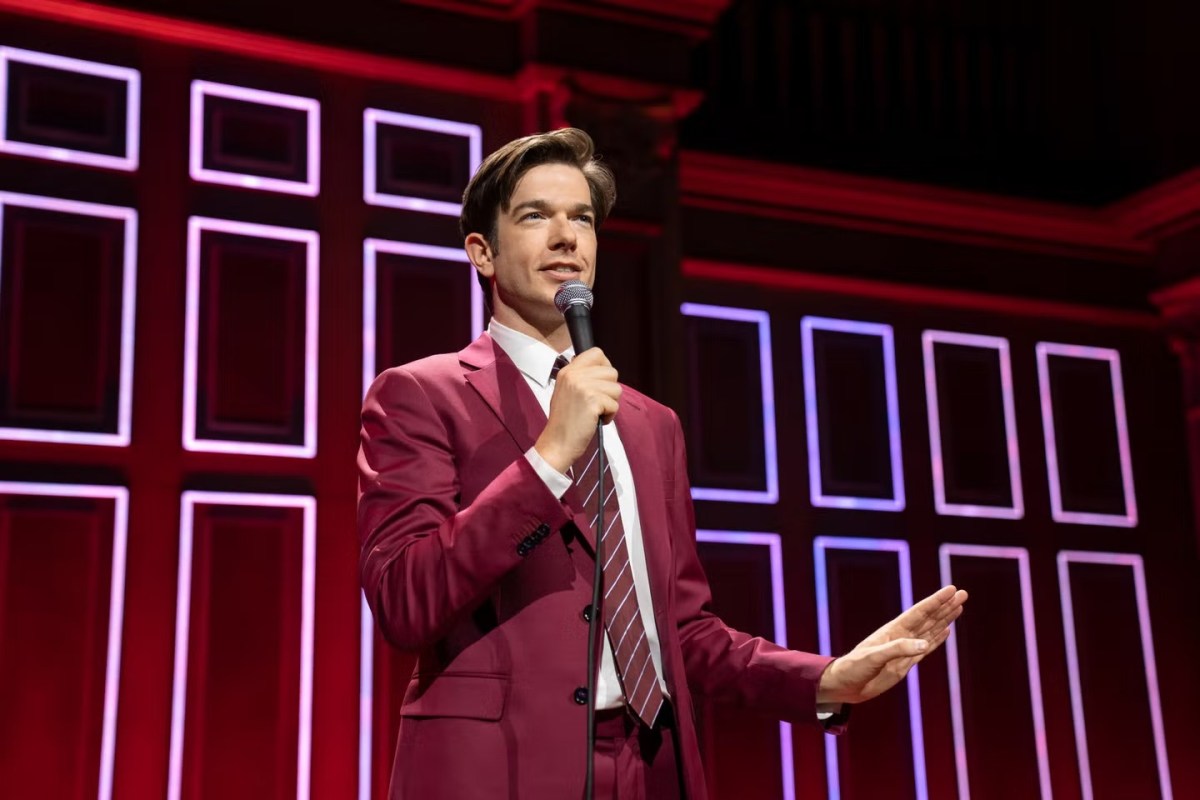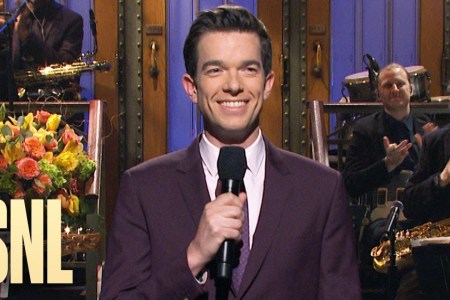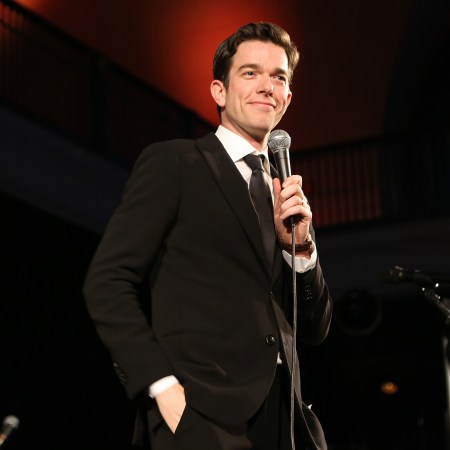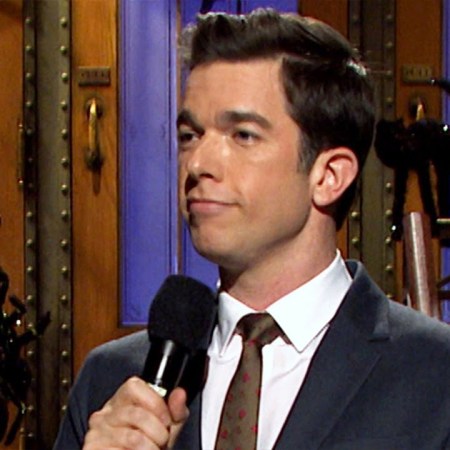There’s a moment early on in John Mulaney’s Netflix special Baby J, filmed at Boston’s Symphony Hall in February of this year, when the comedian spots an 11-year-old boy named Henry in the crowd. Before launching into the material most of the adults in the room paid to see — all the sordid details about his highly publicized drug relapse and subsequent stint in rehab to address his addictions to cocaine, Adderall, Xanax and Klonopin, not to mention his divorce from his wife Anna Marie Tendler and his new relationship (and baby!) with actress Olivia Munn — Mulaney singles out the kid for some crowd work (“Do you know, like, who I am, or did a babysitter cancel and suddenly you were in a van?”) before issuing a warning: “Well, Henry, if you’ve seen me do stand-up before, I kind of have a different vibe now.”
It’s presented as a funny off-the-cuff moment, but it’s nearly identical to one from his October 2021 set in Philadelphia as part of his “From Scratch” tour, where he singled out a young audience member — this time a 14-year-old who identified himself after Mulaney asked if there were any kids in the crowd — and riffed on the fact that his material is no longer suitable for impressionable youth. Of course, it never really has been; he’s referenced his past substance abuse issues in his bits for years now, but until his relapse in 2020 it was always from the safe vantage point of someone who had been sober for over a decade. The guy we saw onstage — in a suit, delivering hilarious-but-rarely-filthy jokes at a rat-a-tat clip — felt very far removed from the guy he alluded to in his material.
That’s the thing, though: we have no idea which Mulaney is the “real” Mulaney because like all comedians, he has relied on a carefully crafted onstage persona. He knows what to play up for laughs and what to carefully tuck away from view, just like he knows that it’d be funny if at one point in his first post-rehab set he picked out a kid in the audience and made a few seemingly ad-libbed jokes about how it’s now inappropriate for him to be there. For years, he would devote large chunks of his sets to talking about how much he loved his wife and how much the two of them didn’t want kids, so naturally, when the news of his divorce and subsequent baby with Munn broke, fans felt personally betrayed. The term “parasocial relationship” entered the lexicon as psychologists weighed in on why, exactly, Mulaney’s fans felt so let down. So many other comedians’ big scandals involved actual deplorable crimes — masturbating in front of people without their consent, grooming underage fans, that sort of thing — and yet Mulaney found himself being eviscerated for the relatively tame and certainly-not-cancelable offenses of relapsing and then splitting up with his wife. (We can all agree that addiction is a disease and that rather than shaming him, we should be commending him for being open to receiving the help he needed, yes?)
Watch John Mulaney Compare Founding Fathers to ’92 Chicago Bulls on “SNL”
The comedian hosted “Saturday Night Live” for the third timeIt’s the elephant in the room — perhaps only Chris Rock’s post-Oscars slap special was more highly anticipated in terms of offstage drama waiting to be addressed — and Mulaney knows he has to tackle it early. After a brief, funny bit about secretly wishing one of his grandparents would die as a child so he could get more attention in school, he apologizes for starting the night off on such a dark note. “I didn’t want to come out all phony, you know,” he explains, before slipping into an exaggerated song and dance. “Like, ‘Hey, Boston! It’s time to laugh! Raise up your smiles, lower those masks/ You know what I mean, we all quarantined/ We all went to rehab and we all got divorced and now our reputation is differrrrrrreeeeeennnnttttttt.’” He pauses here for laughs — which, of course, are uproarious — before continuing: “No one knows what to think/All the kids like Bo Burnham more because he’s currently less problematic.” Finally, he mimes tipping an invisible cap like a barbershop quartet performer before delivering a final flourish that also conveniently serves as his set’s thesis statement: “Likability is a jailllllllll.”
Once he rips off that bandaid, he’s free. There are no further mentions of his divorce or his relationship with Munn, but he spends the next hour and 20 minutes or so speaking candidly (and yes, somehow still hilariously) about the intervention held by 12 of his closest friends — “a ‘We Are the World’ of alternative comedians over the age of 40,” as he describes it, that included Seth Meyers, Fred Armisen, Nick Kroll, Bill Hader and Natasha Lyonne among others — as well as his subsequent stint in rehab and some of the extremely dark, rock-bottom moments that preceded it.
Through it all, he’s unafraid of poking a hole in his previous persona and coming off as unlikable. A significant portion of the set is devoted to him recalling in great detail just how much of an asshole he was to everyone at his intervention. (“I walk in the room, there’s six of my friends sitting there in person in New York and six of my friends over Zoom, from L.A,” he recalls. “You may be thinking ‘Hey, if that was me, I would have been like, ‘If you’re so worried about me, how come you didn’t fly in?’ Don’t worry. I said that several times.”) There’s a very good, goofy bit about Pete Davidson, who was unable to attend the intervention, calling Mulaney in rehab to check on him and being confused for Al Pacino that Mulaney prefaces by quickly dispelling any rumors that Davidson was ever a bad influence on him. “Some people suggested that he and I did drugs together, because he has tattoos and I am plain,” he quips.
The most memorable moments, however, are the ones where he peels back the curtain and lets us in on some of his worst moments, offering glances of the things he was willing to do and the positions he put himself in while deep in the throes of addiction. One bit is centered around the sketchy doctor who prescribed him all the narcotics he was abusing; he ran his practice out of his apartment and would always insist that the comedian take off his shirt for seemingly no reason other than wanting to see him shirtless, and yet Mulaney kept coming back to him because he needed his fix. Elsewhere, he tells the story of a time when, almost immediately after instructing his accountant to freeze his accounts so he couldn’t spend money on drugs, he changed his mind and somehow found one credit card that still worked. Desperate for cash, he used the card to buy a $12,000 Rolex and pawned it for $6,000 the very same day.
It’s an objectively sad story — one that paints a grim picture of just how out-of-control his drug problem really was — and yet, in Mulaney’s hands, it’s funny against all odds. On paper, there’s absolutely nothing to laugh at about someone being so desperate to use that they’re willing to eat what amounts to more than three months’ rent for most folks to do so. But Mulaney’s a pro, and with Baby J he proves why he’s one of the most talented comics of his generation. He knows exactly what details to dwell on and which to breeze past to turn tragedy into comedy, and at the end of it he offers an important reminder: “As you process and digest how obnoxious, wasteful and unlikeable that story is, just remember, that’s one I’m willing to tell you.”
The implication, of course, is that even though this material is a “different vibe” than what we’re used to from him, it’s still a carefully curated version of events. The Mulaney we see onstage still isn’t necessarily reflective of his whole, multidimensional self; he can’t be. That’s simply not how stand-up comedy works. If we wanted real, we’d listen to a therapy session instead.
But despite that, Mulaney insists that the past few years have taught him not to worry so much about what other people think of him — realizing, quite darkly, that their potential criticisms are no match for his own self-destructive tendencies. “All I cared about was what people thought about me,” he says. “And I don’t anymore, because I can honestly say what is someone going to do to me that’s worse than what I was gonna do to myself? What, are you gonna cancel John Mulaney? I’ll kill him.”
In a way, he already has. The Mulaney we thought we knew is dead and gone. John Mulaney’s Netflix Special, Baby J, isn’t necessarily his funniest special, but it feels like his most important — one that comes a little closer to bridging the gap between his onstage character and his real-life issues, airing his dirty laundry so we can all catch a whiff of it and then finally move forward.
This article appeared in an InsideHook newsletter. Sign up for free to get more on travel, wellness, style, drinking, and culture.

























